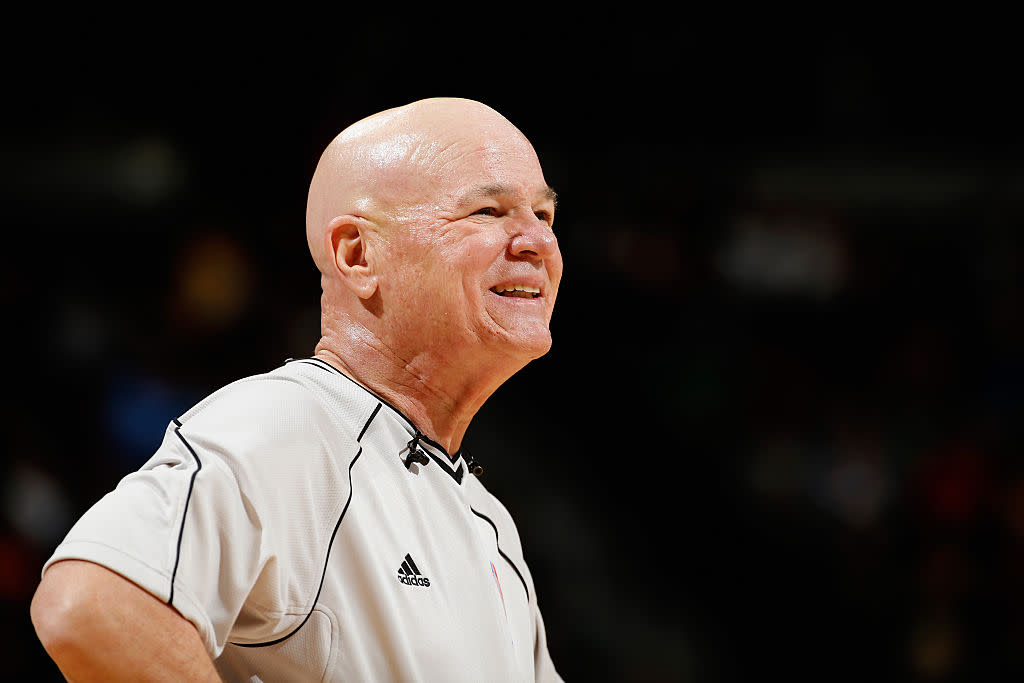Joey Crawford: David Stern ordered me to get therapy after ejecting Tim Duncan for laughing

Before retiring in 2016 after 39 years in stripes, Joey Crawford earned a reputation as one of the NBA’s best, toughest, most expressive and hottest-tempered referees. In the minds of many, one incident best exemplified Crawford’s hair trigger: the 2007 incident in which he slapped San Antonio Spurs superstar Tim Duncan with a pair of technical fouls for smiling while sitting on the bench:
As ludicrous and hilarious as it seemed in the moment, Crawford’s decision to give Duncan the gate got serious in a hurry when, according to Duncan, the veteran official challenged the All-Star power forward to a fight. That crossed a line, earning Crawford a suspension for the rest of the regular season and the entire 2007 playoffs — a reprimand delivered, as then-Commissioner David Stern said in his announcement, “in light of similar prior acts by this official” that merited such a “significant” penalty. (Those “prior acts” included the time he ejected Don Nelson from a playoff game for staring at him with his arms folded, and another incident in which he’d exploded on Flip Saunders heading into halftime, among others.)
Crawford has previously attributed his clash with Duncan and the punishment that followed it with changing his life, telling the New York Times in 2012 that it helped him “come to the realization that maybe the way you’ve been doing things is not the proper way and you have to regroup, not only on the court but off the court.” Specifically, it led Crawford to seek the aid of a sports psychologist to help him find a way to manage his anger … although, as he revealed to ESPN’s Jackie MacMullan in a portion of her ongoing series on mental health in the NBA that focused on the stress, anxiety and other issues that referees face, doing so wasn’t necessarily all his idea:
The Duncan incident was in 2007. Duncan was sitting on the bench laughing. And I threw him. That laugh bothered me. I thought it was incredibly disrespectful. But I knew the minute it happened I was gonna be in trouble.
[The suspension] was a big deal. It really shook me. That’s when I realized, ‘I gotta do something about this.’ I had to talk to a professional to help me deal with all the anger.
Stern suspended me for the rest of the season. I thought there was a good chance my career might be over. Stern orders me to go see a Park Avenue psychiatrist. He tells me to go twice — two hours each session. This guy is going to make a determination on whether I’m crazy or not. I go up, and I’m scared to death. I’ve already been fined $100,000. I’m in a suit, and I’ve got sweat all the way down to my belt. So, this psychiatrist didn’t know a basketball from a volleyball. After two hours, he says, ‘OK, we’re all done.’ I said, ‘Whoa, whoa, whoa, whoa! I’m supposed to come another day for another couple of hours. Have you already decided I’m crazy?’ He said, ‘You’re not nuts.’ I said, ‘Well, what am I? What’s my problem?’ He said, ‘You’re overly passionate about your job.’ I thought, ‘OK, I can live with that diagnosis!’

After that meeting, Crawford — who has said in the past that he’d spoken with a sports psychologist before (after he T’d up Bill Fitch so hard he broke a finger) , but hadn’t done so regularly — wound up seeing Philadelphia-based sports psychologist Jeff Fish. Together, they began the work of not only identifying the sources of Crawford’s anger and the triggers that could send him over the line, but also of finding practical strategies for venting steam in those moments to avoid blowing his top completely:
He would tell me, ‘Joe, if you feel [the anger] coming on, just do something with your hands. Put them by your side or behind your back.’ He told me, ‘Keep reminding yourself, calm down, calm down. If somebody was getting on me about a bad call, he’d remind me, ‘Slow your breathing down. Remind yourself you’re a good ref.’ Those things helped me get through my last 10 years in the NBA.
“Those things” aren’t always easy to find, especially if you’ve already built up a lifetime of bad habits and worse responses to them. But Crawford’s story offers a reminder that even the most hard-boiled and leather-lunged sort can find them with some help, some hard work … and, sometimes, a didn’t-know-you-needed-it-until-you-got-it push from someone else.
On one hand, it’s kind of a shame that the Duncan incident is the first thing many people will always think about when Crawford’s name comes up. On the other, though, if it led Stern to prompt him to seek the help that allowed him to begin dealing with his anger issues, extended his career and improved his overall quality of life … well, maybe that’s not such a shame, after all.
More NBA coverage:
– – – – – – –
Dan Devine is a writer and editor for Yahoo Sports. Have a tip? Email him at devine@yahoosports.com or follow him on Twitter!
More from Yahoo Sports:
• Pat Forde: OSU’s Meyer decision shows winning is everything
• Ex-MLB manager ups the ante with epic meltdown
• Cowboys star out indefinitely with rare autoimmune disease
• Kevin Iole: UFC announces historic superfight


